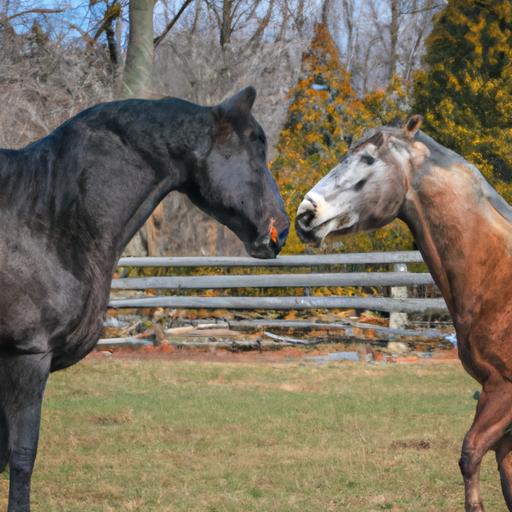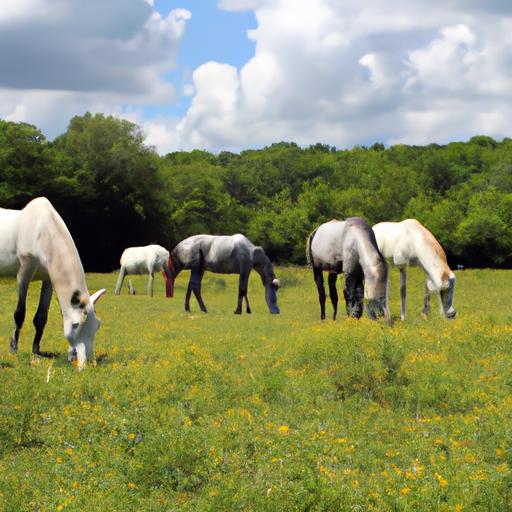Unlock the secrets of equine behavior & management. Explore common behavioral issues, detailed solutions, and the importance of professional help.
In the world of horse management, understanding equine behavior is more than just a skill – it is the key to unlocking a harmonious and successful relationship with our equine companions. As horse enthusiasts, we all strive to provide the best care possible for our beloved horses, and that begins with comprehending their behavior patterns and needs. In this article, we will delve into the fascinating world of equine behavior and explore its vital role in effective horse management.
When we observe horses grazing peacefully in a field or witness their graceful movements, it is easy to overlook the complexities of their behavior. However, beneath their majestic exterior lies a world of innate instincts and social dynamics that shape their behavior. Understanding these behaviors is crucial for several reasons. Firstly, it allows us to create a safe and secure environment that meets their physical and psychological needs. By recognizing their natural instincts, such as herd mentality and flight response, we can design management systems that minimize stress and promote overall well-being.
Equine behavior directly influences the effectiveness of our handling and training methods. By understanding their behavior, we can tailor our approaches to suit their individual temperaments and learning styles. This enables us to establish trust, build a bond, and achieve desired outcomes more efficiently. Moreover, a deeper understanding of equine behavior empowers us to detect early signs of discomfort or distress, enabling prompt intervention and preventive measures to maintain their health and welfare.
In the next sections, we will explore the various aspects of equine behavior and delve into the strategies for managing and modifying undesirable behaviors. By delving into this fascinating subject, we will equip ourselves with the knowledge needed to develop a profound connection with our horses. So, let’s embark on this journey together and unlock the secrets behind equine behavior and management.
Stay tuned for the next sections where we dive into the intricate world of equine behavior and its impact on effective horse management.
Understanding Equine Behavior

A. Definition and Explanation of Equine Behavior
Equine behavior refers to the range of actions, reactions, and patterns of communication exhibited by horses. It encompasses their responses to external stimuli, interactions with other horses and humans, as well as their instinctual behaviors rooted in their evolutionary history. By delving into the intricacies of equine behavior, we can gain valuable insights into the motivations and needs of our equine companions.
B. Natural Instincts and Social Behavior of Horses
Horses are social animals with a hierarchical herd structure. Understanding their natural instincts and social behavior is vital for effective horse management. Horses have a strong herd instinct, seeking safety and companionship in a group. They rely on body language, vocalizations, and subtle cues to communicate within their herd. By recognizing these behaviors, we can better understand their social dynamics and foster healthy relationships between horses in our care.
C. Factors Influencing Equine Behavior
Various factors shape equine behavior, including genetics, environment, and past experiences. Genetic predispositions can influence temperament traits, such as boldness or sensitivity. The environment in which horses are raised and live plays a significant role in shaping their behavior. Factors like the availability of forage, the presence of stressors such as loud noises or confined spaces, and the amount of social interaction all impact a horse’s behavior. Additionally, past experiences, including previous handling and training methods, can shape a horse’s behavior and responses.
By considering these factors, we can create an environment that supports natural behaviors and minimizes stress for our horses. Understanding their genetic tendencies and past experiences helps us tailor our management approaches to meet their individual needs and optimize their overall well-being.
In the upcoming sections, we will explore the importance of equine behavior in horse management and delve into strategies for effectively managing and modifying behaviors. Get ready to uncover the secrets behind successful equine behavior and management!
Importance of Equine Behavior in Management

A Safe and Efficient Management System
Understanding equine behavior plays a pivotal role in creating a safe and efficient management system for our horses. By delving into their natural instincts and social dynamics, we can design facilities and routines that minimize the risk of accidents and promote a stress-free environment. For instance, recognizing horses’ herd mentality allows us to implement appropriate turnout arrangements, ensuring they have companionship and reducing the likelihood of separation anxiety or loneliness.
The Role of Equine Behavior in Training and Handling
Equine behavior is closely intertwined with the effectiveness of training and handling practices. By gaining insight into their behavior patterns, we can tailor our training methods to suit their individual temperaments and learning styles. Some horses may respond better to positive reinforcement, while others may require a more assertive approach. Understanding their behavior allows us to establish clear communication, build trust, and develop a harmonious partnership with our equine companions.
Impact on Health, Welfare, and Performance
Equine behavior has a significant impact on the health, welfare, and performance of horses. By observing their behavior, we can identify signs of stress, discomfort, or illness at an early stage. For example, changes in eating habits, social interactions, or movement patterns could indicate underlying health issues. Addressing these concerns promptly promotes their well-being and prevents potential complications.
Moreover, understanding equine behavior helps us create an environment that supports their natural behaviors, reducing the risk of behavioral problems and promoting mental and physical health. By providing opportunities for social interaction, mental stimulation, and appropriate exercise, we enhance their overall quality of life.
In conclusion, recognizing the importance of equine behavior in management is essential for providing optimal care to our horses. From creating a safe and efficient management system to tailoring training methods and promoting their well-being, understanding their behavior is the foundation for a successful partnership. By delving deeper into equine behavior, we can further explore strategies for managing and modifying behaviors to enhance the bond we share with our equine companions.
Managing Equine Behavior
Understanding equine behavior is just the beginning; implementing effective management strategies is what truly sets us on the path to success. In this section, we will explore the key aspects of managing equine behavior and creating a harmonious environment for our horses.
Developing a Comprehensive Management Plan
A comprehensive management plan is the foundation for successful horse care. It involves considering equine behavior and tailoring our practices accordingly. By taking into account the natural instincts and social behaviors of horses, we can design routines that promote their physical and mental well-being. This includes establishing consistent feeding schedules, providing ample turnout time, and ensuring access to clean water and suitable shelter.
Providing a Suitable Environment
Horses thrive in environments that cater to their behavioral needs. They are social animals that require interaction and companionship. Therefore, it is essential to provide them with opportunities for socialization, either through turnout with compatible herd mates or through supervised interactions. Additionally, providing mental stimulation, such as toys or regular changes in the environment, can help prevent boredom and unwanted behaviors.
Strategies for Addressing Undesirable Behaviors
Even with the best management practices, horses may exhibit undesirable behaviors. It is crucial to address these behaviors promptly and effectively. One approach is to identify the root cause of the behavior and modify the environment or routines accordingly. For instance, if a horse is prone to cribbing, providing a suitable cribbing deterrent, along with environmental enrichment, can help redirect their focus.
Importance of Positive Reinforcement
When it comes to training and modifying behaviors, positive reinforcement is a powerful tool. By rewarding desired behaviors with treats, praise, or scratches, we can reinforce positive associations and encourage the repetition of those behaviors. This approach not only builds trust and confidence but also fosters a positive and enjoyable training experience for both horse and handler.
In the next section, we will explore common equine behavioral issues and provide practical solutions to address them. By combining our understanding of equine behavior with effective management techniques, we can create a harmonious and fulfilling partnership with our equine companions. Let’s delve into the world of behavioral challenges and discover how to overcome them.
Stay tuned for the next section where we discuss common equine behavioral issues and their solutions.
Conclusion
In the realm of equine behavior and management, we have uncovered the profound significance of understanding and addressing the behavioral needs of our horses. By recognizing their natural instincts, social dynamics, and individual temperaments, we can enhance their overall well-being and establish a deeper bond with our equine companions.
Throughout this article, we have explored various aspects of equine behavior, highlighting its importance in effective horse management. By incorporating this knowledge into our practices, we can create a safe and secure environment that meets their behavioral needs, ultimately promoting their health, welfare, and performance.
It is essential to remember that no horse is without its unique set of challenges. In the quest for optimal equine management, it is crucial to identify and address common behavioral issues that horses may exhibit. From separation anxiety to herd-bound behavior and aggression, understanding the underlying causes is the first step towards finding effective solutions.
For each behavioral issue, we have provided detailed solutions and management techniques to help guide you in overcoming these challenges. However, it is important to recognize that some behavioral problems may require the expertise of a professional. When dealing with severe behavioral issues or when your efforts do not yield the desired results, seeking the guidance of an experienced equine behaviorist or trainer can make all the difference.
In conclusion, equine behavior and management are intricately intertwined, and by prioritizing the understanding and addressing of equine behavior, we can create a harmonious and fulfilling partnership with our horses. Let us embark on this journey of equine behavior and management, always striving to provide the best care for our equine companions.
Thank you for joining us on this enlightening exploration of equine behavior and management. For more insightful content and resources, visit Horsemasterypro.com.


